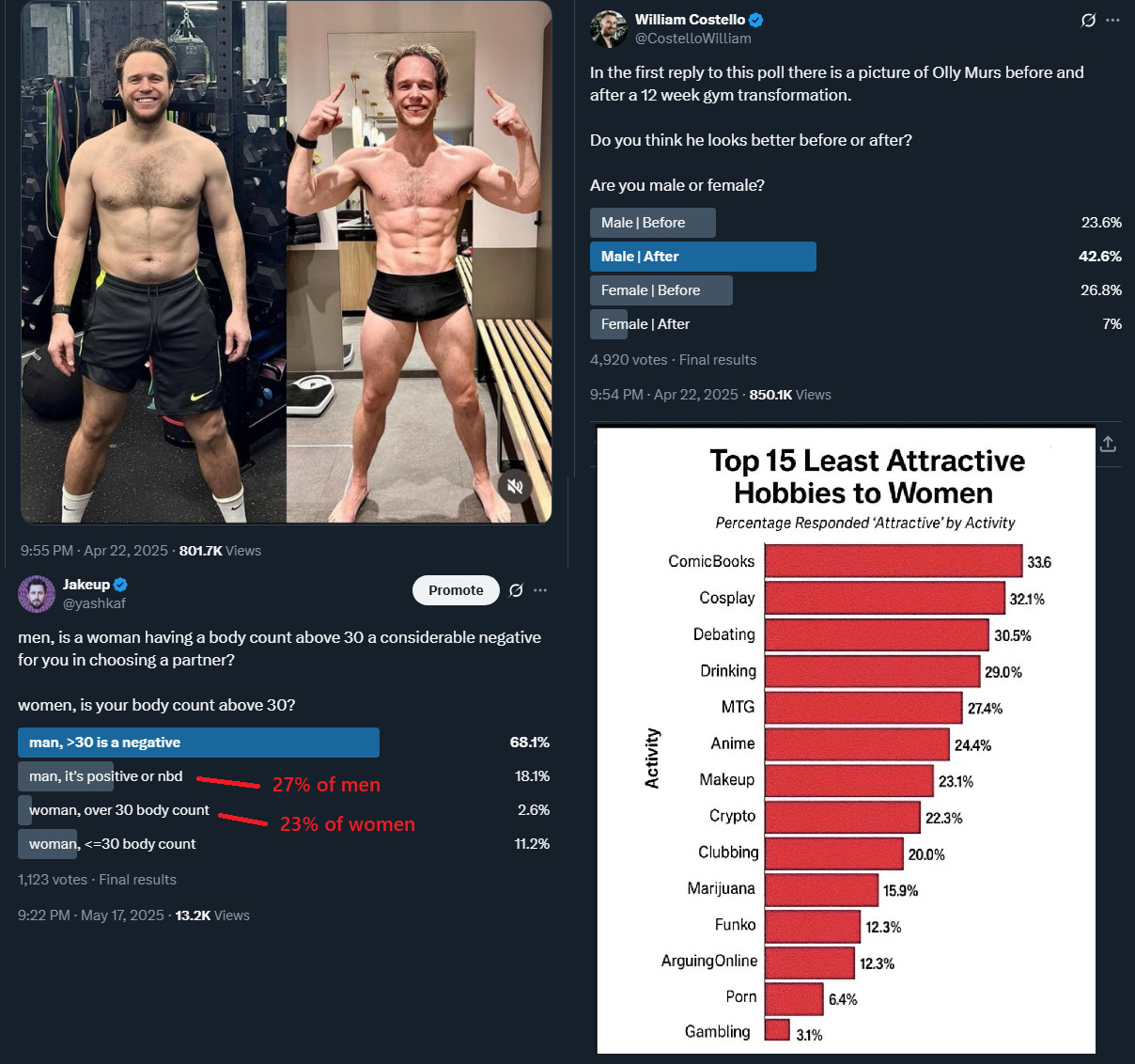Uncut Gems
The cult of optionality makes people attractive and entirely impossible to date
What’s more beneficial for a man’s dating life, to get shredded at the gym or learn to sew for cosplay? Is it easier to find a husband by religiously abstaining from premarital sex, or being a proud hyperslut? Feel free to consult the charts below.
At first glance, the answer is “none of them are good”. All four are a minority preference for the opposite sex, desired by only 20-40% of potential partners. But dating is a market — supply matters just as much as demand. The fraction of men with chiseled abs or women with a vetted orgy guest list is a lot less than one in ten. Of the eight birthday gangbang fluffers, at least two are expecting babies with their devoted partners right now. Being a minority taste is good if no one else cooks like you do, and it makes filtering for a good match that much easier.
They’re all attractive for another reason too: they show differentiation and commitment. All four are ways of being somebody, a person who follows their own path in life. This has been the theme of the last several posts: the journey from being a nobody in the dating market to becoming one half of a great relationship, committed and unique.
It starts with setting goals and pursuing them with integrity, having one clear course of action that succeeds automatically instead of deciding what to do and who to be at each turn. A coherent self is built by active practice, not through introspection or following someone else’s instructions. It makes you powerful, but not necessarily balanced. This is good: great couples complement each other’s strengths, weaknesses, and imbalanced tendencies; if you go too far, a loving partner can fix you.
But no one can help you if you choose to go nowhere at all, if you simply sway to and fro with the waves of what everyone else is doing, becoming a smooth well-rounded pebble in a pile of identical stones.
To continue the mineralogy metaphor, differentiation and commitment are the process of cutting a gem out rock. A singular individual has flaws and sharp edges, but they sparkle. What is shaved away with each cut is optionality.
The Cult of Optionality
We yearn for freedom, but freedom is hard to grasp or measure. So instead, we worship optionality. The two are often confused in a historical lens: comparing liberal society to the traditional ones it positions itself against, lack of individual freedom was visibly manifest in lack of options. People had fewer choices around where to live and work, what they could buy or consume, and whom they could date.
But this doesn’t mean that maximizing the number of choices open increases freedom.
I value liberty immensely, and I appreciate that we’re blessed with a degree of choice that our ancestors could only have dreamed of. But the truth is that liberty is enantiodromic; too much of it leads to its opposite.
Modern liberal society is defined by its lack of constraints, but rather than make people feel free, it tends to make them feel lost. Without a system to guide us through the labyrinth of dizzying possibilities, we resort to our evolutionary programming, mimicking our peers or following animal impulses that lead us into neurological traps like addictions to porn and news, or indoctrinations into cults and ideologies, or obsessions with status and money.
In today’s world it’s possible to have a wide range of choices, but for most of those choices to be a trap. Therefore, the freest people are not those with the most choices, but those with the best ones. And the only way to have the best choices is to live a life of structure and discipline, taking the hard path over the easy, favouring the long term over the short. Paradoxically, we must restrain ourselves to be free.
This quote is from an interview on Freya India’s Substack, which talks about the cult of optionality as a pitfall for young women. Therapy culture (especially on social media, not the actual therapist’s office) is a major culprit. Avoiding all commitment is called “protecting your peace”, “setting strong boundaries”, and “choosing yourself”. Obligation is oppression, and even duties freely chosen are a “people-pleasing fawn response”.
Parents used to worry if their daughters waited too long to get married; now they object if their kids commit to starting a family in their mid-20s. Instead of committing, young people are expected to make money, stay hot, gain generic prestige from school and work, build weak-tie networks of acquaintances and followers, and become “well-adjusted”.
Ivan Vendrov calls these “maximally fungible social capital”. These all give you the optionality to get some group of people to do arbitrary things for you in the undefined future. In contrast, minimally fungible social capital means getting something specific and non-transferable from a single person: a loving relationship.
Optionmaxxers rich in fungible capital are attractive, but hard to date. I wrote about this paradox in the context of very hot women, and the same is true for men. A tall funny rich guy is a dream bf, but he’s not your dream bf. What does he lack that only you can offer, that will make it worth sacrificing all his optionality capital for? You could try to seduce him by maximizing your own general fuckability. But having two partners with infinite optionality isn’t making the process of settling down and staying together any easier.
Optionmaxxers choose contracts over covenants. They give only what is fair, not all they can. They want to be asked out, not to take any risk. A lifetime habit of keeping your options open can be very hard to break.
The common meme is that commitment itself is fungible, that if a guy is “married to the gym” he has less commitment juice to give his wife. I don’t think this is true short of Isaac Newton-level obsession, and people like that show little interest in romance anyway.
I think in reality there are people who gladly commit to something they’re aligned with, and people who aren’t aligned with anything enough to commit. When we met, my wife respected my loyalty to my employer even when I had other options, and I admired her perseverance through long, hard years in biology grad school. Are you so permanently delightful that dedication isn’t something you need in a partner?
Slack
Insofar as you have a choice, it’s probably not between being a bodybuilder or cosplayer, virgin or hyperslut. The choice is between leaning into whichever minority preference self you feel called to be or engaging in the mimetic competition for fungible capital.
The competition is often quite fierce. You don’t earn money, prestige, and clout by doing whatever you feel like. There are strict rules to each game, and you have to play hard to score points. You have to be reactive, constantly on alert for threats to your optionality. Keeping your options open eats a lot of your slack.
Committing to the bit preserves your slack, not your options. Doing what you’ve decided to always do isn’t very hard. It takes time, but it doesn’t eat your unclaimed attention. When you meet someone who wants more of that in their lives, it’ll be easy for them to trust that they’ll always get it from you.
This trust creates shared slack in the couple, more room for each person to do their own thing without worrying that they’ll knock their partner off course. It makes it easier to give when you have and to ask when you need. When you’re not maximizing the number of doors, you can start building a house together.




I don’t really understand the remark about slack: it opens the space to be less generally fuckable and still finding someone you love, you mean? I’d say, general fuckability does the same thing: if you’re fit, gracious and confident, you have space to not need to search for women desperately and can instead observe your local EA club girls dancing around you in circles, waiting for you to notice. Or, you have more slack for a faux pas while talking to someone, regardless if you’re willing to settle or not. Could you elaborate?
Off only optionality,
ill impacts irritate.
Less lax, less loose, lone liberty
gifts grander gains. Go great!